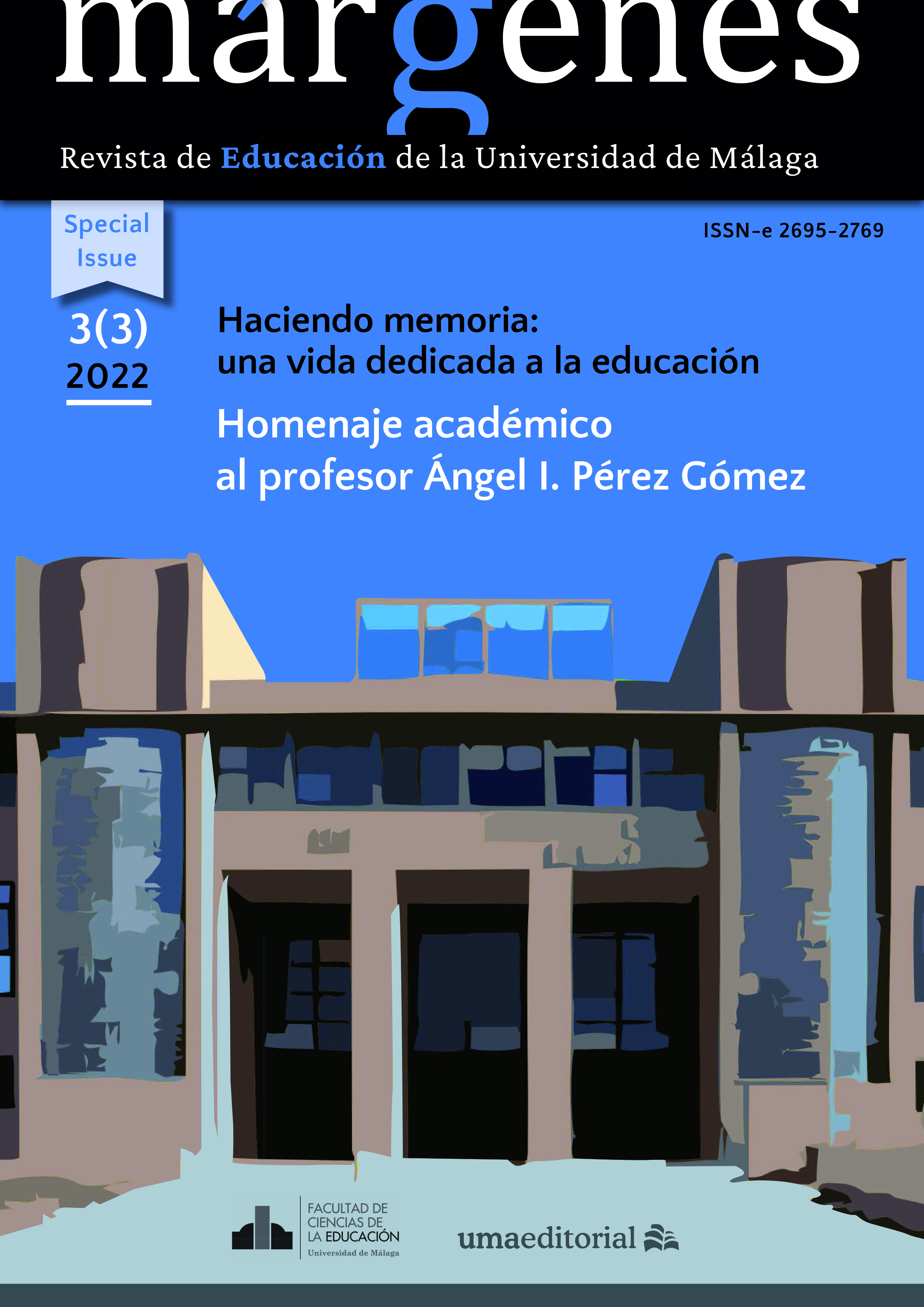Me cambió la vida
DOI:
https://doi.org/10.24310/mgnmar.v3i3.14649Palabras clave:
Educación, Aprendizaje relevante, Conocimiento práctico, Lesson Study, Formación del profesoradoResumen
Cuando la formación universitaria tiene como objetivo la transformación de las personas, de sus actitudes y de sus actos, ésta exige un trabajo profundo sobre sí mismo; requiere tiempo y esfuerzo, nos expone a la mirada de otros, nos invita a cuestionarlo todo y puede ir acompañado de una crisis o cambio de identidad. El pensamiento de Ángel ha sido el sostén de toda mi carrera personal y profesional, el motivo de que la autocrítica, la pasión por el saber y el compromiso con la educación formen parte de mi día a día. Sin duda, Ángel me cambió la vida, pero gracias a su legado la sigue cambiando a numerosos maestros y maestras que un día deciden caminar contracorriente y darle sentido a su experiencia, provocando la inquietud de quienes, dormidos en el inconsciente creen hacer las cosas correctamente, sin pensar, sin reflexionar… sin sentido.
Descargas
Métricas
Publicación Facts
Perfil de revisores N/D
Información adicional autores
Indexado: {$indexList}
-
Indexado en
- Sociedad Académica/Grupo
- N/D
- Editora:
- Universidad de Málaga
Citas
Damasio, A. (2001). El error de Descartes. Barcelona. Drakontos.
Damasio, A. (2010). Y el cerebro creó al hombre. Destino.
Davidson, R. J. y Begley, S. (2012). The emocional life of your brain. Hudson Street Press.
Dudley, P. (2015). Lesson Study. Professional learning for our time. Routledge.
Imbernón, F. (2007). La formación permanente del profesorado. Nuevas ideas para formar en la innovación y el cambio. Graó.
Korthagen, F. (2010). La práctica, la teoría y la persona en la formación del profesorado. Revista Interuniversitaria de Formación del Profesorado, 68 (24,2), 83-101.
Lewis, C. (2009). What is the nature of knowledge development in lesson study? En Educational Action Research. 17(1),95-110. https://doi.org/10.1080/09650790802667477
Marina, J.A. (2012). La inteligencia ejecutiva. Ariel.
Mora, F. (2014). Neuroeducación. Sólo se puede aprender aquello que se ama. Alianza Editorial.
Morgado, I. (2007). Emociones e inteligencia social. Las claves para una alianza entre los sentimientos y la razón. Ariel.
Muñoz González, L.C., Rodríguez Robles, C. y Serván Núñez, M.J. (2022). La Lesson Study en el prácticum y el Trabajo Fin de Grado de Educación Infantil: un contexto para iniciarse en la práctica docente de forma reflexiva y cooperativa. En Á. I. Pérez y E. Soto (Coords.). Lesson Study: Aprender a enseñar para enseñar a aprender (pp. 307-328). Morata.
Peña Trapero, N., Márquez-Román, A., Fernández García, I.M. y Muñoz González, L.C. (2022). Infancia, aprendizaje y rol docente... Haciendo visible lo invisible. Un estudio multicasos en el grado de Educación Infantil En Á. I. Pérez, A.I. y E. Soto (Coords.). Lesson Study: Aprender a enseñar para enseñar a aprender, (pp. 265-284). Morata.
Peña, N. y Pérez, Á.I. (2019). Las disposiciones subjetivas de los docentes en la superación de las resistencias al cambio ante procesos cíclicos de formación basados en la investigación (Lesson Study): Estudio de un caso. Revista Complutense de Educación. 30(2), 569-587. https://doi.org/10.5209/RCED.57780
Pérez Gómez, A. I. (1998). La cultura escolar en la sociedad neoliberal. Morata.
Pérez Gómez, A. I. (2012). Educarse en la era digital. Morata.
Perrenoud, P. (2008). Desarrollar la práctica reflexiva en el oficio de enseñar. Graó.
Polanyi, M. (1983). The tacit dimensión. Gloucester.
Pozo, J. I. (2014). Psicología del Aprendizaje Humano. Adquisición de conocimiento y cambio personal. Morata.
Schön, D. A. (1998). El profesional reflexivo: cómo piensan los profesionales cuando actúan. Paidós.
Sockett, H. (2006). Teacher dispositions: Building a teacher education framework of moral standards. American Association of Colleges for Teacher Education.
Publicado
Cómo citar
Número
Sección
Licencia
En la Revista Márgenes apostamos claramente por una política de acceso abierto del conocimiento científico (Veáse Declaración de Berlín).
Aquellos autores/as que tengan publicaciones con esta revista, aceptan los términos siguientes:
-
Esta revista provee acceso libre inmediato a su contenido bajo el principio de hacer disponible gratuitamente la investigación al público. Todos los contenidos publicados en Márgenes, están sujetos a la licencia de Creative Commons Reconocimiento-SinObraDerivada 4.0 Internacional.
Es responsabilidad de los autores/as obtener los permisos necesarios de las imágenes que están sujetas a derechos de autor.
Los autores-as cuyas contribuciones sean aceptadas para su publicación en esta revista conservarán el derecho no exclusivo de utilizar sus contribuciones con fines académicos, de investigación y educativos, incluyendo el auto-archivo o depósito en repositorios de acceso abierto de cualquier tipo.
La edición electrónica de esta revista esta editada por la Editorial de la Universidad de Málaga (UmaEditorial), siendo necesario citar la procedencia en cualquier reproducción parcial o total.
- Los-as autores-as podrán adoptar otros acuerdos de licencia no exclusiva de distribución de la versión de la obra publicada (p. ej.: depositarla en un archivo telemático institucional o publicarla en un volumen monográfico) siempre que se indique la publicación inicial en esta revista.
- Se permite y recomienda a los-as autores-as difundir su obra a través de Internet (p. ej.: en archivos telemáticos institucionales o en su página web) antes y durante el proceso de envío, lo cual puede producir intercambios interesantes y aumentar las citas de la obra publicada. (Véase El efecto del acceso abierto).

















